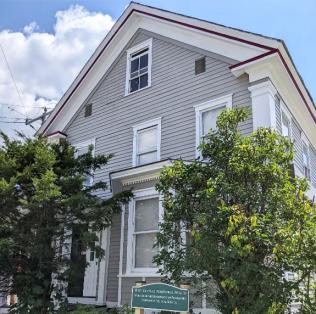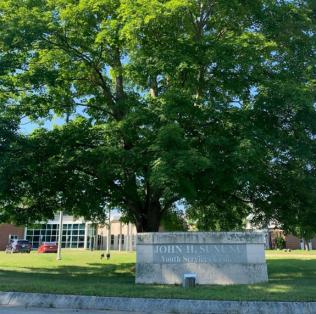Child and Adolescent Psychiatry (CAP)-1 Year
The first-year curriculum is implemented experientially through a combination of required rotations across a range of treatment and institutional settings including an adolescent psychiatric inpatient unit here at Dartmouth and at The Brattleboro Retreat, an academic medical center psychiatric outpatient clinic at Dartmouth, a private non-profit community mental health center, an academic medical center acute-care pediatric medical surgical consultation service at Dartmouth, an academic medical center outpatient pediatric neurology clinic and other specialized community sites.
The clinical experiences provide a graduated, closely supervised and integrated introduction for fellows to the knowledge, skill, and attitude objectives of the first-year curriculum in each of the 6 required competency areas. Fellows in all clinical activities and faculty members are directly available at all clinical sites. Fellows are expected to complete faculty-directed readings before and during the rotation, as well as to undertake independent reading on their cases. Fellows are routinely given “at the point of contact” formative feedback during the daily course of clinic and more formal feedback at the completion of each rotation. Summative feedback is provided by the program director at least twice yearly based upon faculty evaluations and an annual 360-degree assessment process.
The Brattleboro Retreat, Brattleboro, Vermont
Inpatient Child and Adolescent Psychiatry
This is a 1-month, full-time inpatient rotation during the first training year. Each fellow spends time on latency and, or adolescent age units, depending on preference, under the direct supervision of an attending faculty child and adolescent psychiatrist. The service emphasizes the assessment and care of seriously disturbed children and adolescents ages 3 to 18 who require 24-hour care. Participation in substance abuse programs for adolescents is a part of the experience at Brattleboro. There is the opportunity to work with the youth in the residential treatment program and on the transition age LGBTQ specialty unit at Brattleboro as well.
As a member of a clinical team, the fellow is typically directly responsible for the care of 4 to 8 patients and is expected to be familiar with all patients being treated by the team. Fellows are responsible for completing and documenting comprehensive initial psychiatric evaluations as well as providing on-going care and post-discharge planning for all of their patients.
Fellows make daily rounds on all patients on their team and attend regular multi-disciplinary team treatment planning and clinical case conferences.
Fellows participate in frequent, daily treatment activities, including individual, group, and family therapies. Fellows design and monitor pharmacological treatment plans and work with community providers to coordinate post-discharge treatment. For patients admitted involuntarily or remanded by the juvenile justice system, fellows participate in forensic evaluations and appear in court as needed. The experience at Brattleboro offers fellows the opportunity for significant autonomy as well as exposure to a well-established, historically notable, inpatient institution outside of the academic medical center environment.
Fellows continue to spend 1 day per week (Thursdays) at Dartmouth Hitchcock Medical Center for didactic learning, clinical conferences, and supervision.
Dartmouth Hitchcock Medical Center
Inpatient Rotation
The newly opened Adolescent inpatient unit at Dartmouth Hitchcock Medical Center provides fellows a 3-month intensive experience in inpatient psychiatry focused on the care of adolescents with both general psychiatric disorders and more complex medical-psychiatric and neuro-immune disorders. Fellows work closely with faculty managing all aspects of patient and family care on this six-bed unit. Collaborative opportunities to work with our Neuropsychologists, Child Psychologists, an array of Pediatric sub-specialists, and Child Psychiatry specialists in neuroimmune disorders such as PANS/PANDAS, is a particular strength of this rotation experience.
The Child Fellowship at Dartmouth has traditionally had a light after hours on-call experience. With the opening of our new inpatient Adolescent Psychiatric unit, fellows will have weekend call approximately averaging every 6 weekends. The exact schedule will be determined by the Chief in consultation with the Fellows as a group. Weekend responsibilities include coming in-house, rounding on the 6 patients with the attending faculty child psychiatrist and writing progress notes for the day. Fellows do not cover the emergency room either during the weekends or weeknights but serve as back-up, and provide at-home telephone availability to the general adult psychiatry residents who are in house for emergency room coverage. Weeknight call is approximately 1 in 6, at home, with Child Psychiatry faculty.
Outpatient Child and Adolescent Psychiatry rotation
This is a longitudinal rotation that spans 2 years and provides the opportunity for continuity of ongoing care for select patients as well as training in our unique model of rural consultative/collaborative care. The time spent seeing outpatients at Dartmouth Hitchcock Medical Center is the mainstay of the training experience at Dartmouth, supplemented with contemporaneous rotation assignments in Community Mental Health, Substance Abuse and Eating Disorders specialty programs.
When assigned to Dartmouth Hitchcock Medical Center, fellows typically see 2 to 4 new outpatient evaluations per week. New patients are generally seen for 90 minutes, with anywhere from 1 to 3 shorter 45 minute follow-up visits scheduled as needed. All new cases are seen in the Consultation and Evaluation Clinic (Tuesdays & Fridays) or the Neurodevelopmental Psychiatry/Autism Care Clinic (Wednesdays) with direct faculty supervision. Evaluations are done both live and using tele-video format.
Fellows will have on average 6 to 8 additional hours per week of patients for medication management and psychotherapy evaluations and treatment (typically Mondays or Thursday afternoons). Over the course of training, this core caseload will include a range of ages, disorders, and treatment modalities.
Though the majority of therapeutic services in the section are in time-limited episodes of care, fellows are encouraged to accept appropriate long-term treatment cases from colleagues or referrals and to work with the program director and supervisors to establish a diversified and balanced caseload. As part of the CAP outpatient experience, fellows may also co-lead therapies for children and adolescents and families with faculty psychologists. Specific models integrated into the training program include parent behavioral management training therapies, cognitive behavioral therapies including those for depression, anxiety, and post-traumatic stress, and family therapy.
Fellows are encouraged to accept appropriate long-term treatment cases from colleagues and to work with the program director and supervisors to establish a diversified and balanced caseload. As part of the CAP outpatient experience, fellows will also co-lead therapies for children and adolescents and families with faculty psychologists. Specific models integrated into the training program include parent behavioral management training therapies such as helping the non-compliant child, cognitive behavioral therapies including for depression, anxiety, and post-traumatic stress, and family therapy.
Pediatric Consultation-Liaison (CL) rotation
CL is a longitudinal rotation that spans the duration of the fellowship but is most intensive when fellows are working on the inpatient unit. During their inpatient rotations on the Adolescent Inpatient Unit at Dartmouth, Fellows will be available for consultation to the Children’s Hospital at Dartmouth (CHaD) Pediatrics Department in the afternoons. Consultations are done in tandem with an attending Child Psychiatrist Consult-Liaison specialist. Additional time rotating on CL is completed during periods in the second year of fellowship, for example when there are gaps in inpatient coverage by first year fellows, or for vacations and covering for colleagues when away. The CL rotation coverage is arranged by the Chief Child Fellows.
The core activity of the rotation is responding to requests for psychiatric consultation that originate with the Children’s Hospital at Dartmouth, an acute care 23-bed inpatient medical/surgical unit, an 8-bed pediatric intensive care unit (PICU), and a large outpatient clinic that includes the entire spectrum of pediatric sub-specialty services. The vast majority of requests are from the inpatient service and the PICU, although requests may also come from one of the general or specialized pediatric outpatient clinics and the crisis service. Patients range in age from infancy through adolescence and are referred for evaluation for a wide variety of psychiatric problems, as well as problems with adjustment to medical disability or medical procedures, compliance with medication and separation from family and peers.
Consults are reviewed with an assigned attending faculty member who also interviews the patient and counter-signs fellow notes. Fellows are responsible for writing a consult note and maintaining follow-up contact with medical staff and with patients as appropriate. Assessment involves clinical interviews of patients, various family members, and medical personnel. Recommendations are provided to the team and family for in-house and post-admission management.
Pediatric Neurology rotation
This first-year rotation is scheduled for a half-day per week (Wednesday afternoons) for 3 months at Dartmouth Hitchcock Medical Center. Fellows are assigned to the Pediatric Neurology outpatient clinic where they participate in new evaluations and follow-ups under the direction of a faculty pediatric neurologist. Fellows may spend time on a multi-disciplinary Pediatric Neurology team focusing on auto-immune related neuropsychiatric disorders such as PANS/PANDAS.
At each clinic, fellows observe clinical evaluations performed by the faculty neurologist or neurology residents. Cases are then reviewed and discussed. Fellows may be expected to perform their own clinical evaluations under faculty supervision.
Child Development Clinic
Child Development Clinic and Neurodevelopmental Psychiatry Clinic (NDPC)
The purpose of this rotation is to permit fellows to observe and interact with very young children at-risk for motor, speech, cognitive, behavioral, attachment, or other disturbances of early life development. The core activity of this rotation is participation in the Child Development Clinic at Dartmouth Hitchcock Medical Center under the direction of a Developmental and Behavioral Pediatrician. Fellows will participate in the information and history gathering and mental status, motor, speech, and developmental examination of children under 5 years of age. CAP-1 fellows receive foundational experience in diagnosing Autism Spectrum Disorders (ASD) in the NDPC setting which is a collaborative effort based in the Department of Psychiatry and staffed by faculty from psychiatry, pediatric neuropsychology, child development and pediatric neurology. Patients range in age from early infancy through pre-school and are referred for evaluation of known or suspected Autism disorder or in NDPC, a wide variety of developmental problems, both acquired and genetic. The majority of patients are seen for consultation, with a small number in ASD clinic continued in ongoing follow-up. In these clinics, fellows are paired and have the opportunity to observe and complete an evaluation in each clinic. Fellows have exposure to Pediatric Neuropsychologist and Psychologists who conduct structured diagnostic assessments such as the Autism Diagnostic Observation Schedule (ADOS), a core component of a comprehensive Autism evaluation. Our Autism Program is a strength of the fellowship.
CAP-2 Year
During the second year, clinical rotations, didactic seminars, and conferences are designed to build upon and expand fellow’s knowledge, skills and attitudes, with fellows having increasing autonomy.
The second-year clinical curriculum is based upon 3 principles. The first is continuity of clinical care of patients in outpatient treatment with increasing sophistication in serving as consultants to primary care. The second is increased levels of clinical autonomy and responsibility that ultimately approach independent practice. The third is exposure to and ability to manage care within the more complex systems of care in the community, state, and region.
The clinical experiences provide a graduated and integrated opportunity for fellows to expand the knowledge, skill, and attitude objectives of the first-year curriculum in each of the 6 required competency areas. Fellows continue to be closely supervised in all clinical activities and faculty members are directly available at all clinical sites. Fellows are expected to complete faculty-directed readings before and during the rotation, as well as to undertake independent reading on their cases. Fellows are routinely given formative feedback during the course and at the completion of each rotation. Summative feedback is provided by the program director at least twice yearly based upon faculty evaluations and an annual 360-degree assessment process.
Dartmouth Hitchcock Medical Center
Outpatient Child and Adolescent Psychiatry rotation
Many of the core activities at Dartmouth Hitchcock Medical Center parallel those in the CAP-1 year. CAP-2 fellows continue seeing new patients in the Consultation and Evaluation Clinic to broaden and deepen their evaluation expertise. They are at the same time granted increased levels of autonomy to see patients without direct supervision as appropriate.
CAP-2 fellows continue with their outpatient treatment cases for medication management and psychotherapy and co-leading time-limited groups for children and adolescents with faculty psychologists. In the CAP-2 year, fellows are encouraged to actively and more independently manage their caseload, implement time-limited, empirically-based treatments, integrate care with primary care and direct the processes of transfer and termination.
Autism Spectrum Disorder and Neuro-Developmental Psychiatry Clinics
CAP-2 fellows participate weekly in the Autism focused Clinic, the ACC, where they have the opportunity to provide continuity of care for children and adolescents who have been diagnosed with Autism and other neurodevelopmental disorders. This clinic is an advanced experience following on the first year’s NDPC foundational rotation, where fellows manage medications and continue to assess and make recommendations for biopsychosocial treatment interventions for children and families. Fellows staff each patient interaction and see the patient together with an attending child psychiatrist with expertise in Autism.
Pediatric Consultation-Liaison (CL) rotation
In the second year, fellows continue seeing patients in consultation on the pediatric inpatient service and in the pediatric intensive care unit, though at a much reduced intensity. Second-year fellows are also expected to take leadership roles in multi-disciplinary meetings with pediatric colleagues and to play a more active role in supporting the pediatric team to formulate a focused consultative question.
West Central Behavioral Health, Claremont, New Hampshire and the John H. Sununu Youth Services Center, Manchester, New Hampshire
Community mental health outpatient rotation
This is typically a year-long, 2 times per month rotation during the CAP-2 year, where fellows get experience in a community based, public sector mental health care system. Fellows are assigned to the Claremont office of West Central Behavioral Health (WCBH) or to the John H. Sununu Youth Services Center (SYSC) in Manchester, New Hampshire under the supervision of an on-site faculty child and adolescent psychiatrist. WCBH is one of the largest community mental health centers in the state and a partner organization to the Department of Psychiatry at Dartmouth. SYCS is the one designated juvenile justice center in the state and provides treatment for adjudicated/incarcerated youth. During their day, fellows typically have 7 to 8 hours of direct patient contact including a mix of new evaluations and follow-up cases. In addition, there is 1 hour per week of supervision with the on-site faculty member. An important feature of the rotation is participating as a member of the agency’s child and adolescent treatment team, gaining leadership experience and working in collaboration with other providers and disciplines at and in the community. Fellows have the opportunity to work with patients requiring complex, multi-agency, and multi-modal treatment plans, including treatment for substance abuse disorders and PTSD.
Electives
All fellows have the opportunity to dedicate a 1-month block of focused elective time or spread elective time over a block of months in the CAP-2 year to an area of their choosing. The goal is for the fellows to invest time and attention in an area of potential future interest. The specific focus can be clinical, academic, or research-based. More extensive time may be allowed depending on the nature of the project, impact on core fellowship activities, and funding. Our electives are not typically “canned” but rather, we work with fellows to craft and design an elective experience commensurate with their interests. Areas in which fellows have designed electives in the past include: deeper experiences in forensic psychiatry, substance use, eating disorders, research in PANS/PANDAS, collaborative projects with the Dartmouth Institute for Healthcare Policy (TDI) on outcomes or innovative methods and more focused experiences in specific evidence-based therapies. For those interested in a deeper dive into the treatment of adolescent anxiety disorders we have an ongoing relationship with a residential program at Mountain Valley, about 20 minutes from the medical center.
Mountain Valley Treatment Center, Plainfield, New Hampshire
Residential Child and Adolescent Psychiatry
Child fellows will have the chance to complete an elective at Mountain Valley Treatment Center (MVTC), a residential treatment program for adolescents with severe anxiety disorders. As a member of the clinical team working closely with the clinical psychologist, child fellows will have the opportunity to learn and participate in the delivery of cutting-edge, evidence-based treatments for anxiety disorders in youth, both in individualized treatment protocols and group settings. They will participate in daily treatment activities, family meetings, team meetings and medication consultations and management. MVTC provides a unique treatment setting where child fellows will gain experience in working with the most severely debilitated youth owing to anxiety disorders.
Chief Fellow rotation
The purpose of the position of chief fellow(s) is to provide a supervised experience for 1 or more CAP-2 fellow(s) in more advanced administrative responsibilities, clinic leadership, and education within the training program. Historically, we have had an Executive Chief, Clinical Chief and Academic Chief. Supervision is primarily by the program director and other faculty as appropriate.




